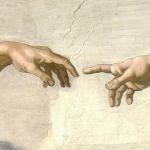According to the doctrine of the Trinity, the ultimate source of all things, the God in whom we live, move and have our being, is both one and plural, one God in three persons. This has enormous implications for how we think of the world.
In ancient philosophy, the highest reality was always thought of as a unified reality. The Form of the Good for Plato, the unmoved Mover of Aristotle, the One of Plotinus and other neo-Platonists. The highest reality was pure unity.
Diversity, plurality, difference was seen as defective or at least as a lesser form of being. Plurality is a fall from an original unity, and the ultimate aim is to be united with the One, to be reabsorbed into unity.
If God is the Triune Creator, this must be wrong. There is difference at the highest level of reality. The source of all things isn’t unified, nor is it a triad of interchangeable persons. It is a fellowship of distinct Persons who are eternally distinct from one another.
Modernity tends in the other direction from ancient thought, Instead of privileging unity, modern thought tends to privilege difference and diversity. Each individual is unique. And, in some forms of modern thought and culture, each individual is treated as a impenetrable atom of human nature. Each is unique and separated. Unity isn’t the original form, but a kind of totalitarianism.
Again, if God is Triune, this must be wrong. There is individuality in the Trinity, but it’s an individuality that is completely dependent on relationality. The Father is individually and uniquely Father because He begets the Son by the Spirit. The Son is uniquely the Son; He will always be Himself and not be Father, but He is so because He is eternally begotten by the Father.
Postmodernity, like modernity, emphasizes difference, but sees all difference as competitive and conflicted. Differences can only be brought into unity by force. The doctrine of the Trinity says that at the origin of all things, what sustains all things, is a God who is internally diverse yet thoroughly at peace. The Father, Son, and Spirit exist within an eternal fellowship that is a harmony of difference.
The ancient problem was one of one and many. What the Trinity shows is not that one and many can be balanced. It shows that the purest form of unity is harmonious diversity, and diversity is dependent on relation. One and many aren’t the same after the Trinity.
That’s still pretty abstract. Let’s make it a bit more concrete and practical.
The Triune God isn’t simply diverse, or triadic. You can have a triad of geometric shapes, but that’s hard to warm up to. The Triune God is a communion of persons.
There has been a good bit of discussion of late about what it means to say that there are three persons in one God.
It has been argued that the early church brought a revolution in metaphysics, the part of philosophy having to do with being. Before Christianity, “person” wasn’t considered an exalted feature. The highest beings were not personal beings, but principles, beyond the interaction and relation that we associate with persons. Christianity changed that by saying that “person” is not merely a role or a mask, but the fundamental reality of the universe and of human beings.
Some will say that “person” doesn’t mean the same thing in ancient Christian writing as it does today. It doesn’t imply “personality.” That’s true. The word has changed meaning over time.
Yet, if we stick with the premise that God shows Himself as He truly is, then we have to say that the Father, Son, and Spirit are persons in something like our sense of the term. They communicate with one another; they speak and reply; they act and react; they love and return love; they give and give again; they make decisions.
The Triune God is the source of all things, the One who keeps all things in existence. And the Triune God is a communion of Persons. We live in a world of cosmic personalism. What moves the world isn’t an impersonal force like Evolution or fate. What moves the world is the Father of Jesus, the Father who is like Jesus, and who moves the world by the Spirit of Jesus.
We can take a step further: We live in a world of cosmic love. The highest unity isn’t the unity of a BB. It’s the unity of persons in a communion of love. The world originates in love. Love is the secret force that moves all things. Love is the destiny of all things.
Human beings are made in the image of this God of love, and so we are destined for love, loving communion with God that produces loving communion with one another.
Love is the organizing principle of the world, and any community without love is out of sync with the ways of the world. Any political or economic system that excludes love is perverse. Any economic system that creates a zone of giftlessness, of loveless competition, fails to reflect the economy of God, which reveals the God who not only shows Himself to be, but is love.
There is no deeper or more precise statement about God’s being than this: God is Love.











